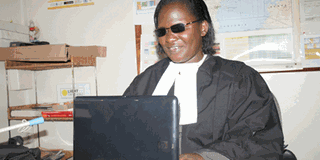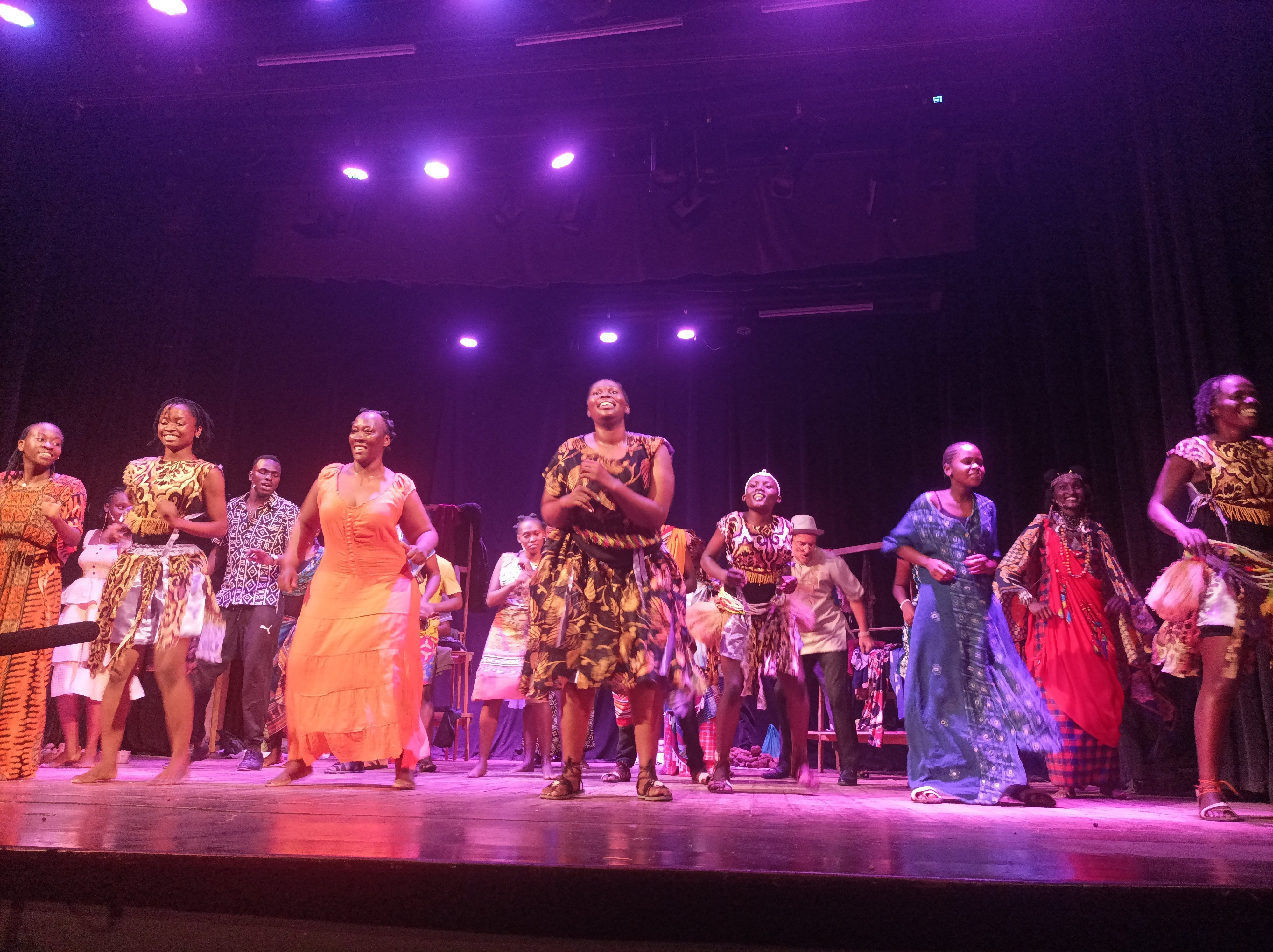Florence Ndagire, the blind lawyer

Florence Ndagire working on her laptop. Photo by Abubaker Lubowa.
What you need to know:
She was born blind, but she didn’t let her condition stop her from maximising her potential
Standing at slightly over 5 feet, Florence Ndagire is a shapely woman, with the kind of figure commonly known as figure eight. When in open space, she walks taking such long strides. And unlike a number of people like her, it is not with the aid of a walking cane.
Clad in a grey suit completing her look with sunglasses, it is impossible to tell she is blind. But Ndagire is a blind lawyer. And that is not all, she can also wash, clean, bathe a child and cook without mixing up sugar and salt when spicing food. It is amazing that she can do all this well yet she is not sighted. Ndagire moves around with a laptop and not as a fashion item – she actually uses it. To prove this, she takes out her 10 inch laptop and places it on the table. Then, she taps around in search for her laptop bag. On finding it, she automatically opens the side bag, takes out her power adapter and gets up to connect it to a power source. Then, she turns on the computer and types away. To do things on her own, she places everything in a particular place and asks everyone in her home to keep it that way.
How a blind person can use a laptop
Installed on her laptop is software that helps read out what is on the monitor. It helps reconfirm what she has typed and is very useful when she is editing. “One, two, three…,” she counts to help her identify the function keys. She has mastered the positions of the home keys.
While touching the correct keys, she says, “Below F is V and below D is C. The finger that types A types Z and Q as well. The one that types S types W and X too.” To find her bearing on a key board, she searches for the keys J and F which have a raised dot that feel like a ridge on touching. To edit, she uses the arrow keys.
But that is not the first thing that will strike you about Ndagire, what will however, is her positive energy. Since people that seem to always be having a pity party are not desirable, Ndagire’s attitude makes her such a likable person.
Before the computer was braille
Before she got a computer, she used braille, a writing system that enables blind and partially sighted people be able to read and write through touch. It is a basic necessity for any blind person to attain education. Recalling when she learnt writing, she says, “In the afternoon, we were taken to a separate class to learn braille. It took us a really short time to learn. I think God gifted us with brilliance, most of us are fast learners.”
But there are things she couldn’t do with the braille. So she missed out on map reading classes in Geography and the practical sections of subjects like Biology, Physics and Chemistry, which subjects she was forced to drop at A-level. At A-level she couldn’t attempt economic questions with graph work. But that aside, she says she was so fast that she dictated to other students that found the teachers too fast for them. At university some students complained that her machine made so much noise that they couldn’t hear but she says they found a way of dealing with it.
Accepting her condition
When younger, she was cheeky about her status. While laughing she says, “I used to tell my siblings that I poured pepper in my eyes and they closed. I have no idea how I came up with that. Then I also didn’t know what was wrong with my eyes but I imagined the pepper story I made up helped solve the puzzle.”
The mother of one says, “I don’t know what light or day looks like but I feel normal. I can do what any human being can. But I am afraid of ironing for fear that I will burn the clothes. Also, the flat iron burns me a lot. However, if I have to, I iron my clothes and my son’s. I also fear going to places whose environments I am not familiar with.”
Surprising interests
Amazingly, during her free time, she likes doing the one thing that could need one to be sighed to enjoy - watching movies. She is crazy about soaps like Second Chance and Nollywood love stories. Ndagire says because she did literature, when she listens she understands. “I establish the themes and sound tracks help me determine the mood. “If you miss something, I can narrate to you,” she says.
Smart woman
Ndagire was born blind, she is the only blind person in her family which earned her mother ridicule apparently for bringing misfortune into the family. “I was born premature at six months and was placed in an incubator. When I matured and was taken home, my parents realised I had no sense of sight 10 days later,” she narrates.
When she was taken to a doctor, he said her cornea which acts as the eye’s outer most lens didn’t develop. That was in 1984. To my parents, there was no option of buying an artificial one.
“Though my relatives thought I was a curse, my mother didn’t. She says what comforted her is that I looked good and was smart. She never had to teach me anything twice.”
There is no doubt she is smart. How would she have been admitted to university on government, been appointed to be the technical advisor sponsorship in the drafting of the Special needs education policy and Child Protection Policy if she wasn’t?
Impressive CV
She says, “Because I am well versed with the law, I have attended so many high profile meetings. I do a lot of advocacy work for people with disabilities. For example I climbed Mountain Kilimanjaro during a campaign to create public awareness of the potential of children with disabilities.”
She has also established Child Rights’ clubs in schools to help sensitise children and urge them to support each other so their rights are not abused. She is also the lawyer for Bond Consult Company limited. Right now, she is in charge of corporate sponsorship for Light for the World.
Challenges
Ndagire says she would love to handle court cases but it is hard for someone like her to get such a job. “Everyone thinks I can’t do anything. Even when I show them that I can, they still don’t hire me. Besides, cases are so much work yet one doesn’t earn a lot. My life is too costly for me to do court work.”
She explains that she uses boda bodas and hires an assistant to help her read documents especially and also pays school fees for her siblings. Because of all these responsibilities, she has decided to stick to working for the better paying Non Governmental Organisations with a hope that one day she will raise enough money to start her own chambers.
A grey childhood
But despite a seemingly bright future, none of her achievement’s came on a silver platter. Ndagire narrates that when her mother left and she started staying with her stepmother, life became hard. “My stepmother didn’t want me to study. The only advantage is that my mother knew the importance of education and took me to boarding school so I could study without disturbance and I got sponsorship.”
When in secondary school, during the holiday, she worked at her church in Mbiko parish, Buikwe District to get money to shop for a new term. At church, she mopped, washed the priests’ clothes and did a couple of other things. She says, “The priest that was sponsoring me insisted that we work during the holiday so that we learn the value of money and I am grateful for that.”
She chose to study Law because she admired Francis Ayume’s desire for justice and because she faced injustices when young and didn’t want people to undermine her. “Thankfully, I am also very aggressive, assertive and shrewd so it is hard for me to be discriminated against or teased,” she says. She forgets to add that she is a jovial person too.
Ndagire says what is hard about being blind is, “that you can’t see, you will never see and you have to deal with it. I accepted it. You also can’t read a newspaper or cross the road alone. But the good thing is people are always willing to help.”
She says her senses of smell and hearing are strong – they seem to be compensating for her inability to see. She adds that “If I could see, I would have loved to see my mother if she were still alive and my son. I am told he is very handsome. But I think I would run mad if I started seeing all of a sudden. I don’t know if human beings look like trees or trees look like people,” she adds laughing.




